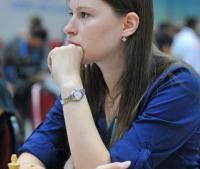
Russia vs. China Match: Rapid Chess
If you have read Part I of the article, you already know that China prevailed in the classical games over Russia: 26-24. Now even more points were at stake: 100 instead of 50; contested in rapid chess. This offered us good chances to overcome our opponents. The Russian women’s team, including myself, was willing to win the rapid competition and compensate for the loss in classical chess.
Before round 1 most of the players were agitated and amused. FIDE recently introduced rapid ratings, so each of the participants was assigned with a different, unfamiliar numerical indicator of one’s strength. This innovation didn’t affect the male grandmasters (none of them had played any rated rapid games by that time), while most of the female players were quite surprised. All of a sudden, Alexandra Kosteniuk became the rating favorite of the women’s tournament with an ELO of 2568!

Diego Garces, Alexandra’s husband, is taking a picture of her before round 1
The time control was 15 min/game + 10s/move. Each round took 1 hour. The players who tended to finish their games last hardly had any chances to take a rest, not to mention preparation. Olga Girya was usually the latest bird, but she didn’t complain in any way and just proceeded from one round to the other non-stop.

Olga Girya fought valiantly without any rest breaks
On each of the two days we were to play 5 games. In the first round we defeated our opponents 3.5-1.5, while our compatriots dominated their partners: 4.5-0.5! The Chinese delegation looked somewhat tired. Maybe it was due to them having gone sightseeing (bridge ceremony before the night) in St. Petersburg. The second round was also in our favor: we won 4-1; our male teammates – 4.5-0.5.

Li Chao is sipping on his tea, while a well-known Russian grandmaster is taking pictures. Can you guess who he is?
After the first two rapid rounds the match looked pretty much over. However, in round 3 China managed to heroically overcome the trend and strike back: both of their teams won 3-2. Our women’s team had an assembly after each round – coffee, tea, sweets, jokes. The Chinese team was even more united: both men and women stayed in the playing hall after each rounds and spent the rest time together.

The Chinese team resting on spectators’ seats between rounds
In round 4 we lost agains with the same score: 2-3. The men’s team drew. We were beginning to feel fatigue, while the Chinese team seemed to have a reserve supply of energy. In round 5 we exchanged blows: the Russian women’s team lost 2-3, while the men’s team won 3-2.

Wang Yue and Evgeny Najer observing Zhao Xue vs. Olga Girya
Standings after Day 1: Women: Russia– China 13,5:11,5. Men: 16,5:8,5.
Here are a few instructive examples from Day 1 of the rapid competition:
Day 2 brought us bad luck. We didn’t manage to hang on to the positive score. In round 6 we lost 2-3 (what a cursed score, isn’t it?) and in round 7 – 1.5-3.5 (or maybe 2-3 wasn’t THAT bad, after all?). The men’s team drew the first match and lost 2-3 in the second. The atmosphere was heating up.

Wang Hao definitely has a trick up his sleeve
In round 8 the roles were reversed: we won 3.5-1.5, but our men’s team lost 1.5-3.5! Just two rounds left; all of us were exhausted; but we wanted to win so badly!
Round 9. We drew; the Russian men had their revenge: 3.5-1.5. Round 10 was the final and decisive one. Our women’s team had a 1 point advantage, so our #1 goal was not to lose. Alas, we didn’t succeed. I had a much better position against Shen Yang, but very little time left. I got nervous and agreed to a draw only to discover that Valentina Gunina and Alexandra Kosteniuk had already lost their games. The other two games were drawn, so we lost the round 1.5-3.5 and, correspondingly, the entire match. The Russian men’s team beat the Chinese team 3-2 and thus came out on top in both classical chess and in rapid. Thanks to their efforts, we also won on the combined standings, so now the historical score of the unofficial Russia vs. China matches stands at 4-4.
Standings in classical chess:
Men: Russia - 13.5; China - 11.5
Women: Russia - 10.5; China - 14.5
Combined: Russia - 24; China - 26
Standings in rapid chess:
Men: Russia - 29, China - 21
Women: Russia - 24.5, China - 25.5
Classical chess + rapid chess:
Men: Russia - 42.5, China - 32.5
Women: Russia - 35, China - 40
Combined: Russia - 77.5, China - 72.5
Ju Wenjun had the best score among women: 10.5 out of 15. In the men’s section Ian Nepomniatchi scored 10 out of 15.
My result was rather mediocre: 1.5/5 in classical chess and 4.5/10 in rapid. Still, it gave food for thought.
Interesting moments from Day 2:
All the photos are courtesy of Eteri Kublashvili, russiachess.org






